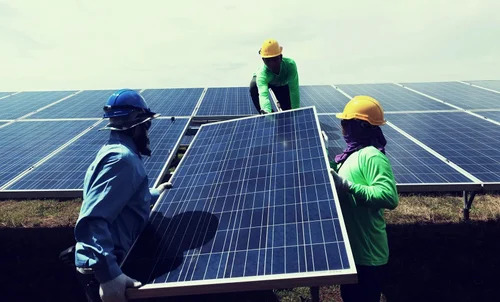The transition to renewable energy is imperative for sustainable development, and Nigeria, with its abundant sunshine, is ideally positioned to leverage solar power. This comprehensive guide aims to provide detailed insights into the prices of solar panels, batteries, and inverters in Nigeria for 2024, while also highlighting the benefits and considerations for adopting solar technology.
Understanding Solar Panel Prices in Nigeria
Solar panels are the primary components of a solar energy system, converting sunlight into electricity. Solar Panel Price In Nigeria can vary significantly based on several factors including the type of panel, its efficiency, and the manufacturer.
Types of Solar Panels
- Monocrystalline Solar Panels: Known for their high efficiency and sleek appearance, monocrystalline panels are typically more expensive. In Nigeria, the price for these panels can range from ₦32,000 for an 80W panel to around ₦225,000 for a 1000W panel.
- Polycrystalline Solar Panels: These panels are less efficient than monocrystalline but are more affordable. Prices for polycrystalline panels in Nigeria start at around ₦21,000 for a 100W panel.
- Thin-Film Solar Panels: While not as commonly used, thin-film panels offer flexibility and a lower cost option. Their prices can vary, but they generally offer a more budget-friendly solution compared to the other types.
Solar Battery Prices in Nigeria
Solar batteries are essential for storing energy generated by solar panels, ensuring a reliable power supply even when the sun isn’t shining. The price of solar batteries in Nigeria can vary based on capacity, brand, and technology.
Key Factors Influencing Solar Battery Prices
- Capacity: Higher capacity batteries, which can store more energy, are naturally more expensive. For instance, a 200Ah battery can cost between ₦100,000 to ₦200,000, while higher capacity options can go up to ₦500,000.
- Brand and Technology: Reputable brands and advanced technologies like Lithium-ion batteries tend to be more costly but offer better efficiency and longevity compared to traditional lead-acid batteries.
Solar Inverter Prices in Nigeria
Solar inverters are crucial as they convert the DC electricity produced by solar panels into AC electricity, which is used by most household appliances. The cost of Solar Inverter Price In Nigeria varies based on capacity, brand, and features.
Types of Solar Inverters
- Pure Sine Wave Inverters: These are the most efficient and reliable inverters, suitable for all types of appliances. Prices can start from ₦50,000 for a basic model and can go up to ₦300,000 or more for higher capacity units.
- Modified Sine Wave Inverters: These are less expensive but also less efficient and can cause issues with sensitive electronics. Prices for these inverters generally range from ₦20,000 to ₦100,000.
- Hybrid Inverters: Combining the functions of both inverters and chargers, hybrid inverters offer greater flexibility and efficiency. They are priced higher, starting from ₦150,000 and can exceed ₦500,000 for advanced models.
Benefits of Solar Power in Nigeria
The advantages of adopting solar power in Nigeria are manifold:
- Cost Savings: Solar energy can significantly reduce electricity bills. With a properly sized system, users can rely less on the national grid and diesel generators.
- Environmental Impact: Solar energy is a clean and renewable source of power, helping to reduce greenhouse gas emissions and combat climate change.
- Energy Independence: Solar power offers a reliable alternative to the often unstable national grid, providing continuous power supply and reducing dependency on fossil fuels.
- Economic Growth: The solar industry can create job opportunities and stimulate economic growth through the establishment of solar farms and manufacturing plants.
How to Choose the Right Solar Technology
When investing in solar technology, several factors need to be considered:
- Energy Requirements: Assessing your household or business energy needs is crucial. This helps in determining the appropriate size and capacity of the solar panel and battery system.
- Budget: While the initial cost of solar systems can be high, they offer long-term savings. It is important to balance upfront costs with the potential for future savings.
- Quality and Warranty: Investing in high-quality components with good warranties ensures reliability and long-term performance. Reputable brands often provide better customer support and longer warranties.
- Installation and Maintenance: Proper installation is key to the efficiency of a solar system. Choosing experienced installers and ensuring regular maintenance can maximize the system’s lifespan.
Case Studies and Success Stories
Numerous success stories across Nigeria highlight the transformative impact of solar energy. For instance, rural communities without access to the national grid have benefited immensely from solar power, enabling them to have reliable electricity for lighting, refrigeration, and even internet connectivity. Businesses have also adopted solar power to mitigate the costs and unreliability associated with diesel generators, leading to significant cost savings and increased productivity.
Future Prospects of Solar Energy in Nigeria
The future of solar energy in Nigeria looks promising. Government initiatives and incentives are encouraging the adoption of renewable energy. Furthermore, advancements in sustainable technology and decreasing costs are making solar power more accessible to the general population. With continued investment and supportive policies, solar energy can play a critical role in addressing Nigeria’s energy challenges and driving sustainable development.
Conclusion
The adoption of solar power in Nigeria is not just an environmentally conscious decision but also an economically sound one. Understanding the prices and types of solar panels, batteries, and inverters can help individuals and businesses make informed decisions. As the country continues to embrace renewable energy, solar power stands out as a viable solution to achieve energy independence, reduce costs, and contribute to a sustainable future. By investing in solar technology, Nigeria can harness its abundant solar resources and pave the way for a brighter and more sustainable tomorrow.













